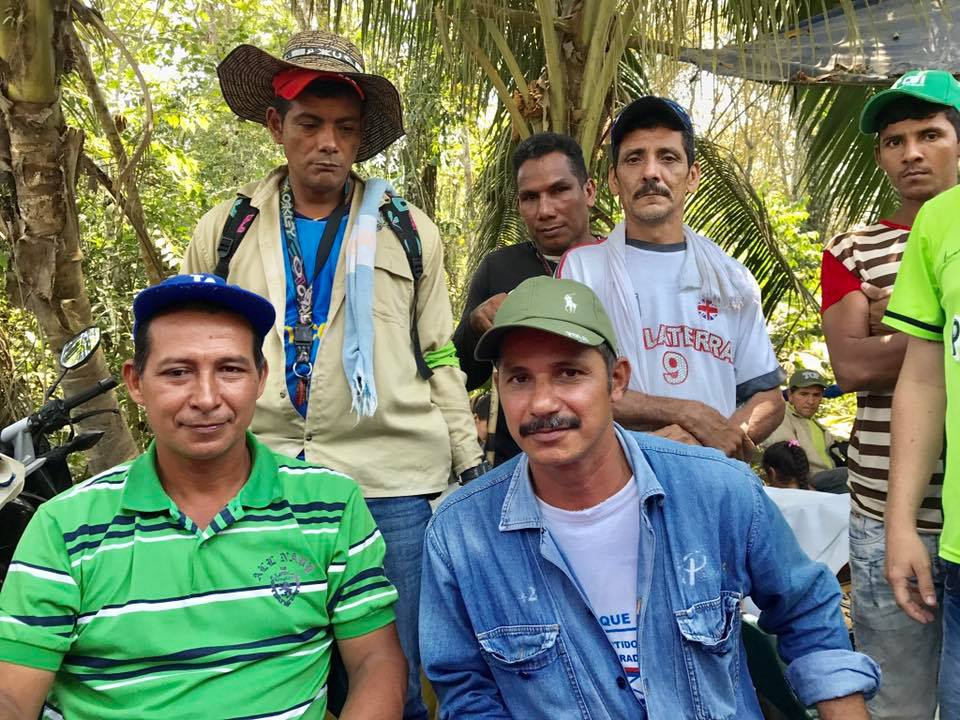
Colombia Palm Workers Win Landmark Agreement
Some 750 palm workers at Colombia’s largest plantation yesterday signed a landmark agreement with their employer, Indupalma, culminating a years-long effort in which many workers risked their lives to achieve decent wages and safe working conditions. The workers formed a union and fought to force the company to sign a formalization accord and negotiate a collective bargaining agreement.

Jorge Castillo, SINTRAINAGRO president, Indupalma management and Colombia’s vice minister of labor sign a landmark contract with far-reaching rights for palm workers. Credit: SINTRAINAGRO
The subcontracted workers—who labor for below-poverty wages and are not covered by the country’s labor laws—will now become permanent employees, with health coverage and union representation. They will no longer be required to pay for their own tools, oxen and other animal care or transport—expenses that often left them in debt to their employer. The contract doubles or triples their wages, provides compensation for work-related injury and illness and establishes safety and health measures.
In January 2018, the palm workers walked off the Indupalma plantation in San Alberto demanding the employer formalize their jobs, with a vast majority casting their ballots for a strike despite their status as subcontracted or “cooperative workers,” which prohibits collective action.
Palm Workers Risked Their Lives in Decades-Long Struggle for Rights
In the early 2000s, companies converted permanently employed palm workers to “cooperative’ status, requiring them to join and pay dues to phony cooperatives—structures that enable companies to evade legal responsibilities under the labor law. Eventually, only 600 palm workers out of 6,000 in the palm producing region in the center of the country were permanent employees, and workers say when they protested their brutal working conditions, they often were threatened or physically attacked by paramilitary forces.
The strike and subsequent agreement at Indupalma caps efforts by palm workers to achieve rights on the job at plantations across Colombia, a struggle that often met brutal retaliation: Up to 130 union activists were assassinated and members of five union executive committees were forced to flee for their lives five times in the past 25 years.
Joining together in a “Pacto Obrero” (coalition of workers), workers throughout Colombia’s palm sector have organized plantation by plantation since 2013, winning contracts that ensure direct hiring and living wages. With support from palm workers at other plantations, the Indupalma strike became so large that the vice minister of labor helped negotiate a preliminary pact in mid-2018.
Palm Workers Made Gains with Global Support
Throughout, palm workers received support from Colombia’s Central Union of Workers (CUT), the AFL-CIO and Solidarity Center, along with a regional labor rights center (CAL); the National Agroindustrial Union, SINTRAINAGRO; and the Corporation for Justice and Freedom (CJL).
Solidarity Center’s engagement with palm workers is part of its larger program in Colombia that supports worksite and industry-wide organizing, intensive education on labor rights under the legal framework that came out of the Labor Action Plan, and legal support for worker demands for access to justice. The Solidarity Center also helped workers develop connections with local, national and political leaders, including members of the U.S. Congress, with whom their meetings provided important political support for ending violence against palm worker activists.
The AFL-CIO and five Colombian labor organizations raised the issue of abusive subcontracting in a May 2016 trade submission under the U.S.-Colombia Trade Promotion Agreement (CTPA) and the U.S. Department of Labor twice reviewed Colombia’s progress in addressing the worker rights violations highlighted in the 2016 U.S. trade submission. In January 2018, the Labor Department’s second review urged the government to “take additional effective measures to combat abusive subcontracting and collective pacts, including improving application of existing laws and adopting and implementing new legal instruments where necessary.”
